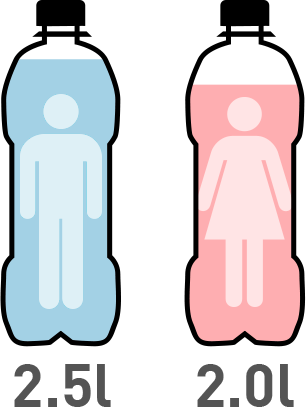Hydration in elderly people
While we may slow down in our old age, our bodies continue to require similar amounts of fluid to remain properly hydrated. Research suggests that under normal conditions and activity levels, men should consume 2.5 litres of water each day and women 2.0 litres.
This guide aims to help elderly people remain adequately hydrated.

Special concerns for the elderly regarding hydration
With age, the body loses its ability to have a thirst response to a fluid deficit, which increases the risk of dehydration. Therefore, in order to stay properly hydrated, elderly people should anticipate the body’s needs and not always wait until they are thirsty to have a drink.
Kidney function usually starts to decline with age, meaning more fluid is lost and increasing the need for water.
Dehydration in the elderly and very elderly is usually more serious and potentially life threatening than in younger people. It can also increase the risk of falls, urinary tract infections, impaired brain function, and other conditions.
Some medications can block the body’s thirst mechanism and affect hydration in other ways.
For some older people restricted mobility can limit access to regular drinks, while those with memory issues may find it difficult to remember when they consumed their last drink.
Helping with the hydration needs of elderly friends or relatives
We recommend that carers and family members provide advice to elderly people on how to hydrate themselves properly, such as encouraging drinking a variety of fluids and offering fluids at mealtime and in between meals.
Carers should be familiar with dietary changes, and any new medications that may affect hydration levels.
Older people in hospital are often dehydrated and those caring for them should have a hydration plan in place for each patient. This should provide an adequate amount of water from a variety of sources and/or intravenous hydration as appropriate.
A number of physical symptoms are associated with dehydration in the elderly. These include decreased consciousness level, dryness under the arms, dry mouth, sunken eyes, decreased tension in the skin; and delayed capillary refill time (meaning the time taken for colour to return to an area of tissue after pressure is applied). If you see these symptoms in an elderly person in hospital, alert the doctor or nurse. If at home, ensure they receive a drink promptly, and if still concerned, contact their doctor.







